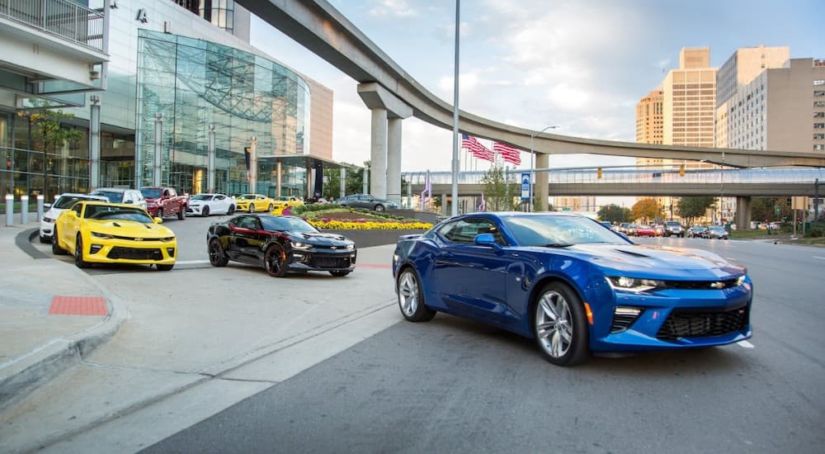There are over 36,000 automotive dealers in the US, that’s enough to stretch to the moon and back. Okay, so that’s a made-up analogy and unit of measurement, however, the number isn’t fake, and that’s a significant amount of dealers to buy used cars from. That averages down to 720 dealers per state, and that number is not evenly distributed. So let’s take a look at the different options and what each will mean to your wallet.
The Basics
When purchasing a used car, there are a couple of things to keep in mind and look out for before making your final purchase. Your first step is deciding where you are purchasing your next vehicle from. There are several outlets to buy a used car, all of which have their benefits and downfalls. Different types of dealers are going to host different benefits, from cheaper prices, more reliable cars, to simply getting qualified for financing; each dealer offers its own unique set of pros and cons. So which is the right choice for you?
Chain Dealers
Many used car buyers will end up shopping with chain dealers for a new or certified pre-owned car. These dealers are all a part of a more extensive corporate infrastructure and are generally under the same name. For example, one large chain may have several different manufacturers, often even under the same roof or on the same lot. The chain stores operate similarly to any other national chain store, such as clothing or restaurants. This means they have brand-wide policies and set ideologies that they must follow.
What this means to you, the shopper, is that there are not many vehicle-specific deals or savings that can be had. Prices are often set at a higher level and require more clearance to authorize price cuts. These dealers also rely on other brand dealerships to make their sales goals, so each sale does not typically hold as much weight to the entire chain, meaning they can afford to lose a sale more than a private or independent dealer. On the other hand, they have a chain-wide reputation that must be upheld, and losing one customer due to poor service means the dealer has lost that customer across every manufacturer/dealership that they offer.
Chain dealers are also able to offer much better and more comprehensive warranties, especially on used cars. A larger dealer network means they can more easily cover different types of vehicles and can handle losses from warranty work. They are also able to certify more vehicles, as certifying vehicles is a heavy cost for a dealer upfront, but bring more profit long-term. They also have higher standards that must be upheld for each vehicle, so most used cars go through a comprehensive check before being sold. Depending on the dealer, they may have the ability to trade with their fellow dealers to offer a wider selection of used cars, helping your search for the perfect vehicle.
Franchised Dealers
Franchised dealers are able to ride the line between independent and chain stores, offering great pricing and security for those buying used cars. Franchise dealers are sanctioned under a larger nameplate but are still owned and operated by local patrons. This gives the franchised dealers the security of chain dealers, but the freedoms of independent stores. The franchise offers them security during slower sales months, as well as making manufacturers warranties an option. Franchised dealers can offer extended warranties on used cars, as well as sell certified pre-owned cars. They can also offer certified technicians to work on the used cars they are selling and perform any service work for your vehicle.
The benefits of the independent dealer come into play when franchise dealers are selling their inventory. They have the ability to set their prices where they feel is best, which means they have much more room to raise their prices, however, it also means they can come down to low prices when they need to sell a vehicle. The ability to set their own pricing gives the dealer the ability to make huge price cuts when a car isn’t selling or they need to make quota, for you this mean you can find huge savings on used cars at franchised dealers.
Much like chain stores, franchised dealers have high standards that must be upheld for the reputation of the franchise owner, manufacturer, or individual store. This means that many of their vehicles must pass a rigorous inspection before being sold, resulting in much higher quality used cars on the market. This also means most dealers will stand behind their product and offer warranties or guarantees on their used cars.

Independent Dealers
Independent dealers are locally owned and have no national connections to chains or franchises. These are typically smaller dealers and often specialize in certain types of vehicles such as luxury, foreign or categories of customers. These dealers are 100% independent and set their own pricing with no influence from an overseeing influence to make certain profits or sell a pre-set quota. Prices are free to be as high or as low as they see fit, as long as they stay within federal and state regulations. That being said, independent dealers have much more on the table than other dealers. Reputation is wildly important, and each sale carries much more importance.They are an intricate parts of the local community and their sales depend heavily on reputation, particularly in smaller markets.
Independent dealers typically only deal in used cars, as getting sanctioned by a manufacturer to sell new cars is a difficult, long, and expensive process. Their vehicles typically come from auction or trade-ins. Since they are not as regulated as chains or franchises, they often do not have as rigorous of an inspection process, if any at all. The vigilance falls on you when purchasing a vehicle through independent dealers. That being said, often the risk is worth the gain. Independent dealers do not have anyone else to answer to when selling a vehicle, which means they typically have lower pricing than the other dealers that have to share their profits with a higher authority. This also means they have much more room to haggle and go back and forth over price if that’s your thing.
These dealers are also great at specializing. They often will sell only foreign vehicles, luxury cars, sports cars, etc. This gives them the ability to narrow down a specific type of vehicle, making them experts in that category. They will have more appropriate pricing, better expertise and will often help you to find a specific car. They also specialize in different types of customers, namely low credit buyers. You’ve seen the ads, “Good credit, bad credit, no credit. No Problem!” These dealers are able to get low credit customers into a car under one catch, high-interest rates. Rates often sore as high as 20-30% and these buy here pay here lots extend the credit to customers for the purchase of a vehicle. This means they can charge higher interest, but also qualify a wider range of customers. As owners of the title and the loan, these dealers also have the ability to install immobilizers on their vehicles that can stop a car at any time if the payments are not made. While the integrity of the buy here pay here lots is not always of the highest caliber, they do provide an essential need to get hard working people into a vehicle. That being said, there are thousands of buy here pay here lots that of the highest quality and are staffed by caring individuals that are helping thousands of customers get into a fantastic vehicle.
The Verdict
Overall, when it comes to purchasing used casr, you have lots of choices in front of you. When it comes to buying from different kinds of dealers, each will offer its own set of pros and cons. The best thing that you can do is be as vigilant as possible, and keep an eye out for anything that seems fishy. If it seems weird to you, that’s because it probably is.



